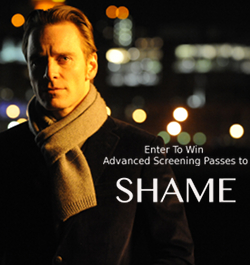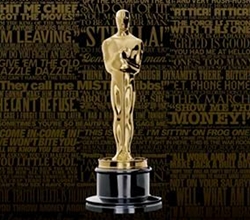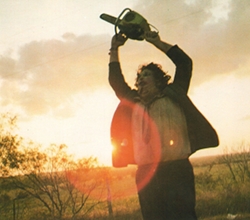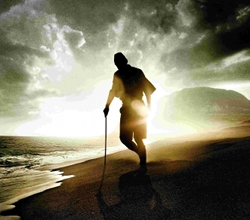Top Ten: Documentaries
The documentary impulse is evident throughout the history of moving pictures. From Lumière actualités to the evening news, examples abound of filmmakers exploiting the camera’s inherent ability to record reality, even when framing, editing, and other mediations cloud the issue. Less a genre than an endlessly pliable form, documentaries purport to give us the truth even when they know they don’t. So with a wide and varied range from which to pick, this week’s Top Ten Tuesday explores the world of documentary filmmaking.
>> Readers Selections
1. Harlan County, USA (1976) 55%
2. The Fog of War (2003) 45%
3. Grizzly (2005) 45%
4. The Cove (2009) 36%
5. The Thin Blue Line (1988) 36%
6. Man On Wire (2008) 27%
7. Hoop Dreams (1994) 27%
8. F For Fake (1973) 27%
9. Night And Fog (1955) 18%
10. Sherman’s March (1986) 18%
>> Adam’s Selections
1. The Up Series (1964 - present)
As much as The Lord of the Rings and The Human Condition, the Up Series deserves to be considered a single monumental achievement, still ongoing in its quest to chronicle the lives of fourteen British individuals every seven years since age seven. The television films were started by Paul Almond and continued by Michael Apted as investigations of the rigid British class structure, working from the assumption that a person’s life was determined mostly by birth; however, as the original child subjects grew up, it became increasingly apparent that individual personalities and twists of fate would severely complicate the thesis of the first film, Seven Up! Class and politics have taken back seats to the unique dramas of each participant, mostly notable that of Neil Hughes, a bright, hopeful child turned homeless squatter with apparent mental illness turned local politician. The cumulative force of each new film, further demonstrating the complexity and unpredictability of human life, testifies to the documentary’s power as time capsule and as a corrective to the easy, uncomplicated answers of mainstream narrative film.
Chris Marker’s playful, magisterial Sans Soleil [Sunless] is a phantasmagoria of sounds, images, and ideas, sprinkled with some fictional personas and devices the better in which the ruminations and associations of all-too-real places and concerns can take root. Starting with the conceit of a woman reading and philosophizing on letters from her globe-trotting cameraman friend who is near-obsessed with Japan, Africa, and Vertigo, the film wittily meanders through notions of representation (de rigeur for a cameraman, even a fictitious one), memory, global history, and the onslaught of media, with plenty of room for one of Marker’s most returned-to subjects, cats. In the end, the tactile, concrete footage of Japanese crowds, volcanoes, even the black film leader displayed in the movie’s opening, undergirds Marker’s flights of fancy and earns the film’s oft-disputed “documentary” label.
This deeply humanistic short by Iranian poet Forugh Farrokhzad potently mixes documentary and poetry to advocate for the suffering inhabitants of a leper colony. Two narrators, a more objective male voiceover that describes the matter-of-fact aspects of the lepers’ existences, and Farrokhzad herself imbuing the proceedings with its elevated, poetic aspects, alternate to illustrate the essential dichotomy of the film: body and spirit. The camera remains unflinching in its portrayal of leprosy victims valiantly coping with daily life, most poignantly children ignored by the outside world (although Farrokhzad adopted two of them during the filming). Without a hint of pity, the film chronicles a community refusing to be defined by its lacks or deformities, while at the same time decrying the societal negligence that makes a leper colony necessary in the first place. Farrokhzad unfortunately died in a car accident five years after the release of The House is Black; in the years since it became a touchstone for the cinematic Iranian New Wave.
Frederick Wiseman is arguably America’s greatest living filmmaker, and his entire career of observing the best and worst of the nation’s cultural and historical institutions will live as long as people wish to be educated by the moving image. After his daring and controversial look at a Massachusetts hospital for the criminally insane, Titicut Follies, Wiseman pointed his unblinking gaze at a day in a Philadelphia high school of the late 60s. Although shorn of narration and a single, clearly discernible storyline, Wiseman’s sharply-edited films frequently take the point of view of individuals against the monolithic establishment, and High School is no different. Regimented and sexualized girls do jumping jacks in inhuman unison during gym class; a boy is told by the dean to take an undeserved detention to show that “you are a man and that you can take orders.” The sexual revolution, Vietnam, and pop music intrude at times, but the administrative disciplinarians, who are themselves frequently insecure, seem to imagine themselves bulwarks against the rising tide of cultural nonconformity. Today, some might say, “The more things change the more they stay the same.”
5. The Emperor’s Naked Army Marches On (1987)
An astonishing portrait of fanaticism and moral culpability, The Emperor’s Naked Army Marches On follows Japanese World War II veteran and avowed political firebrand Kenzo Okuzaki as he investigates the mysterious deaths of two in his regiment. What follows are heated interrogations with survivors and family members, punctuated by indignant violence. Cannibalism, both of New Guinea natives where the officers were stationed and of insubordinate or immoral soldiers, is the horrific impetus for Okuzaki’s quest for the truth; yet he frequently resorts to deception, threats, and ultimately attempted murder to get the answers he wants. The impassive gaze of director Kazuo Hara takes all of this in, never making clear whether he completely condones what his protagonist is doing. A genuinely upsetting and unpredictable examination of a social outsider, the film questions the conformity of official Japanese military history as well as the responsibilities of a filmmaker and his audience.
Frank McDevitt recently delivered on this very site a keen appreciation of the wry, digressive documentary Sherman’s March, so I’ll just highlight some more aspects that I think deserve mentioning. Among these is director/star Ross McElwee’s distinctively halting Southern drawl, as much a feature of his films as spliced-in home movies, national or cosmic ruminations, or his boisterous, eccentric friend and former teacher Charleen. Unlike in many first-person documentaries with voiceover that arose in March’s wake, McElwee’s style of speech effaces authority and emphasizes his provisional, personal spin on things. Few filmmakers, let alone documentarians, can so ably and entertainingly mix the intimate and the universal as the bespectacled, self-effacing McElwee.
A marvelous mixture of industrial noise, pastoral reverie, and the human voice in its varied forms (singalongs, an elegant soprano, radio announcers, conversations at a local dance) animates Humphrey Jennings’s impassioned World War II propaganda film Listen to Britain. These juxtapositions illustrate the stakes of the war: the at-times unnerving hum of the well-oiled war machine is necessary for the continuation of the more benign natural sounds of the playground, tilled field, and orchestra. Jennings’s panoramic study of a nation working together stands firmly alongside such “city symphonies” as Ruttmann’s Berlin and Vertov’s Man with a Movie Camera, putting in the place of avant-garde pyrotechnics the well-worn virtues of camaraderie and steadfastness.
8. Los Angeles Plays Itself (2003)
CalArts-based filmmaker Thom Andersen’s epic video essay is currently caught in the no-man’s-land between art and copyright, but don’t let that stop you from finding and viewing it. An engaging, dense mix of polemic, cultural history, and film criticism, Los Angeles Plays Itself examines over 2 1/2 hours worth of movie footage of LA, ranging from the official classics to the obscure and underseen. Andersen’s narration, read by Encke King, works like an informative lecture in the best film class you’ve ever had, passionate about such underground depictions as Killer of Sheep and The Exiles at the expense of what he perceives as political defeatism and nostalgia in the likes of Chinatown and LA Confidential. Along with Godard’s Histoire(s) du cinéma, this film points in a new direction for documenting cultural history, towards combining the pedagogy of the video essay with the wide range of the found footage documentary.
9. Man with a Movie Camera (1929)
A veritable roll-call of cinematic tools and techniques comprise this impressionistic Soviet masterpiece of a documentary. Polemical filmmaker Dziga Vertov’s major example of “absolute kinography,” a kind of pure cinema indebted to no other art form, explodes with originality even as it’s grounded in the day-to-day experiences of urban life in the Soviet Union, images of which are chopped up and imaginatively puréed. Although conceived with purely ideological intentions, the film is easily enjoyed and marveled at simply for its own sake; the endlessly fantastic barrage of effects continue to influence the avant-garde. Originally silent (the better to appreciate its purely visual artistry and experimentation), Man with a Movie Camera nonetheless has been released over the years with varying soundtracks by the likes of the Alloy Orchestra and Michael Nyman.
10. The Plow that Broke the Plains (1936)
Pare Lorentz, the driving force behind the moving The Plow that Broke the Plains, was one of the most notable documentarians of the Great Depression. Like its companion of a few years later, The River, The Plow indicts uncontrolled industry and agriculture for damage to the Mississippi River and the Great Plains, respectively. Although sponsored by the US Department of Agriculture, the film’s simultaneous celebration and condemnation of westward expansion makes it much more than mere propaganda. The agricultural ingenuity of American settlers was unfortunately matched by their hubristic lack of conservation, Lorentz argues through the film. Booming narration and patriotically rousing score round out this archetypal advocacy documentary.
-
http://eutextilenews.blogspot.com textile reports
-
http://www.jjwirelessworld.com/electric-bicycles-c-7.html ELECTRIC BIKES
-
http://www.basketseo.com LOS ANGELES SEO
-
http://totheplanet.info/family/holidays/very-best-online-casinos-for-baccarat.html Online casino
-
http://www.sextusact.com/its-easier-to-win-money-with-live-dealer-casinos-vs-regular.html Top rated online casinos
-
http://caladrius28.livejournal.com Play blackjack online for money
-
http://www.top10-onlinecasinos.co.uk/secure-online-casino/ secure online casino
-
http://www.hackintoshshop.com electronics
-
http://www.hydra-deicers.com deicers
-
http://www.nursekelli.com alternative medicine













 Review: The Human Centipede II (2011)
Review: The Human Centipede II (2011) Review: We Bought a Zoo (2011)
Review: We Bought a Zoo (2011) Review: Outrage (2010)
Review: Outrage (2010) Subversive Saturdays: Unglassed Windows Cast a Terrible Reflection
Subversive Saturdays: Unglassed Windows Cast a Terrible Reflection Review: Hugo (2011)
Review: Hugo (2011)





